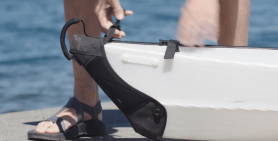

How to … what???
Videos by Outdoors
Binoculars are one of the most frequently overlooked pieces of camping gear, but they’ll make time in the field more enjoyable for the whole family. They allow you to see all kinds of wildlife up close. You can identify birds. Use them to look at the night sky. And they can even keep you safe by showing what lies ahead on the trail and by picking out the best route from Point A to Point B.
Most binoculars for hiking and wildlife viewing are called “center focus.” That means there’s a dial located somewhere between the two eye tubes. It controls the focus of both sides simultaneously when you turn it. Good binoculars also offer a diopter adjustment to compensate for the difference in strength between your eyes. Few people have exactly the same vision out of both eyes.
The location of the diopter adjustment varies. Sometimes it’s a ring below an eyepiece (usually the right). On some, the center focus knob slides back to become a single lens adjustment.
Properly setting diopter adjustment is important. If you experience fatigue or headaches after looking through binoculars, even for a short time, improper adjustment is likely the cause. Setting the diopter is simple and fast. Adjusting the setting works best by using the lens caps that came with the binoculars.
Pick an object at some intermediate distance like 100 yards or so. Sight on something with a lot of contrast and fine detail– like the dark, bare limbs at the top of a tree against the sky.
Assuming the diopter adjustment on your binoculars is on the right lens tube, put the lens cap to cover the right objective lens (the one closest to the object you are looking at). Look through the binoculars with both eyes open. Using the center focus adjustment, focus the view so your left eye sees the object perfectly. Take your time and really make certain the adjustment is absolutely perfect for a sharp view.
Keep looking at exactly the same object and take your finger away from the center focus dial. Uncover the right lens, and cover the left objective lens with the cap. Carefully move the diopter adjustment back and forth (without touching the center focus) to find the sharpest possible view for your right eye on precisely the same object.
You’re almost done.
Some binoculars allow you to “lock” the diopter adjustment in place. Other’s simply provide markings for you to note “hash marks” either plus or minus of zero. It is best to make some kind of physical mark on the dial (a dot of WhiteOut half on the dial half on the body works great). That way if you loan the binoculars to someone else for a look and they change the setting, you can quickly come back to your sweet spot. Several marks are appropriate if your family is sharing one set of binoculars.
One more tip — especially from one year to the next — be sure to recheck the adjustment. Your eyes will change over time so you’ll need to modify the setting as they do.









